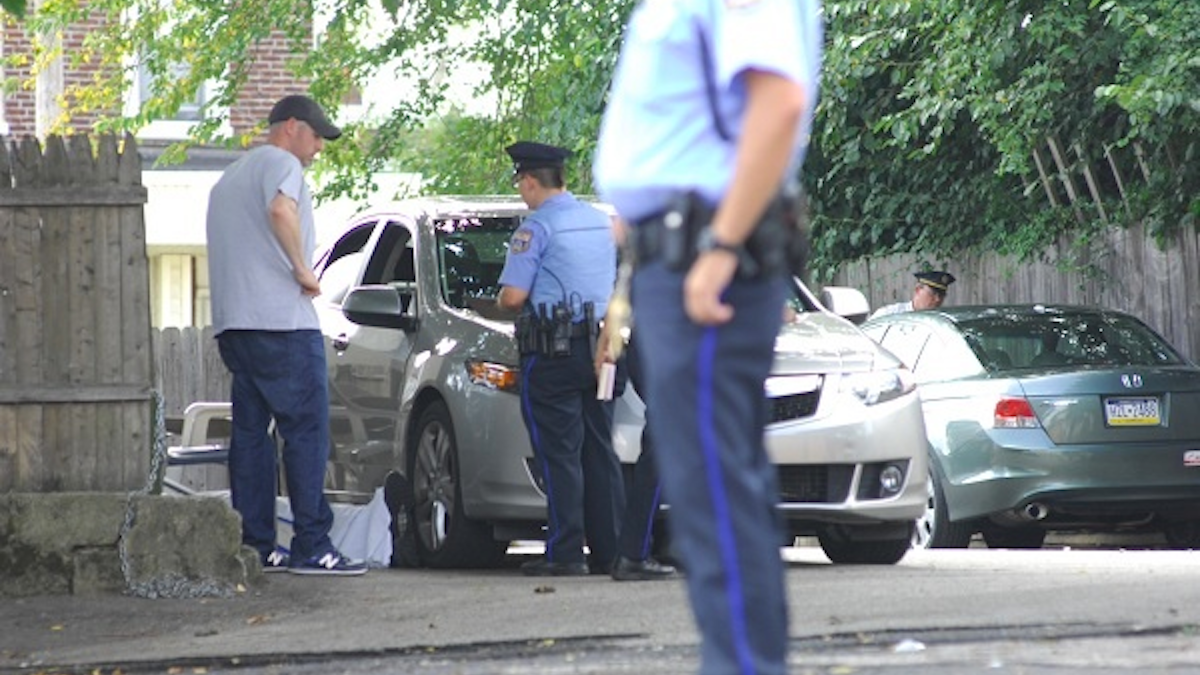Saving the boys of Philadelphia’s summer

At the scene of a fatal shooting in West Oak Lane last summer. (Bas Slabbers for WHYY)
When I was a child summer was a time of friendship and fun, exploration and discovery. It was a time when the world seemed bigger. But as I grew older, summer in Philadelphia took on different meaning.
Wonder increasingly gave way to worry. Exploration was overshadowed by enmity. Discovery was replaced by death. Or so it seemed.
Summer in Philadelphia is still a time when the world is wondrous and alive. Lush green trees and bursts of color pepper the vast expanse of Fairmount Park. Festivals and block parties pump life into our neighborhoods. The rivers that flank our borders are busy with regattas and recreation.
Philadelphia in summer is pungent barbecue smoke and children’s laughter. It’s the crack of the bat at Citizens Bank Park. It’s the splash of water at public pools.
But summer in Philadelphia is also a time when caution is warranted because its joy is often interrupted by violence.
July: Philly’s deadliest month
Philadelphia Police Department statistics say that July, with an average of more than 30 murders annually, has been Philadelphia’s deadliest month over the last decade.
In the neighborhoods where I grew up, there is a common belief that high temperatures are the precursor to summer violence. Perhaps that’s true. But how to explain that October, a decidedly cooler time of year, has been Philadelphia’s second deadliest month of the past decade, averaging more than 30 murders?
There is no real rationale because violence often defies explanation. Summer, on the other hand, does not.
Excessive spare time
Summer is the time of year when teens and young adults are free to manage their own time, and to act out in ways that may or may not be productive.
In a city where 19 percent of the residents are high school dropouts, according to Pew Charitable Trust’s State of the City study, we are producing a young adult population that is increasingly and tragically idle. And like my mother used to say, idle hands are the devil’s workshop.
Perhaps it is a coincidence that 24.5 percent of homicide victims in Philadelphia were between the ages of 18 and 24 in 2012. Or perhaps it is a consequence of kids dropping out. Maybe it’s just bad luck that as these kids get older—if they get older—their chances don’t improve; nearly 39 percent of homicide victims were between 25 and 34 in 2012, according to police statistics.
Or maybe things are exactly as they seem.
A tie to education?
Maybe, as District Attorney Seth Williams has repeatedly said, there is a correlation between the proliferation of high school dropouts and the violence plaguing Philadelphia’s young people.
In my estimation, this simply means that summer is not the time to stop thinking about the importance of education. It is the time to start.
To put it bluntly, if a young person has decided to drop out of school, we have to use the summer months to speak the truth, to change their minds, and to save their lives, because believe me, their lives are on the line — especially if they’re young black men.
Fatal demographics
Last year, nearly 80 percent of Philadelphia’s homicide victims were black, 87.6 percent were male, and 70 percent were under the age of 35.
These young men were not all high school dropouts. Some were college graduates. Others were husbands and fathers. Still others were pillars of their communities.
But being a high school dropout makes a young man more likely to be a victim or perpetrator of violence. And summer — a time of hot days and good times — is a dangerous time to end up being a statistic.
Reclaiming summer
Having grown up on Philadelphia summers, I know that our hottest months are an exciting time for a young man.
It is the strident strain of Hip Hop blasting from passing car speakers, or the allure of young women in summer attire. It is a time of time of friendship and fun, of exploration and discovery.
It is a time when the world seems bigger.
But summer is also a time to reflect on one’s direction. So this summer, I plan to find at least one young man to mentor, influence and guide. Because I can’t watch too many more of our boys become numbers.
I know they can be so much more than that.
WHYY is your source for fact-based, in-depth journalism and information. As a nonprofit organization, we rely on financial support from readers like you. Please give today.


